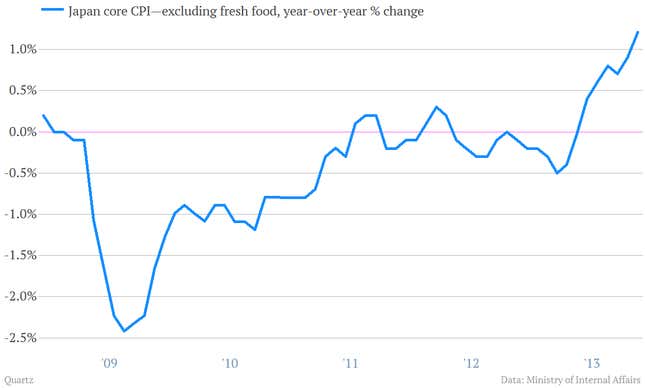Japan seems like it is finally turning the tide in its decades-long battle with deflation.
Broad-based, persistent declines in prices are a drag on economic growth. (If prices are falling, it’s a good idea to hold off on spending and investment until they fall just a bit further. When everybody holds off on spending, the economy suffers.)
That’s why pushing prices higher is a key component of Abenomics, Prime Minister Shinzo Abe’s multi-pronged plan to use fiscal and monetary stimulus to jolt Japan out of its economic malaise. And it’s working. Last week inflation data for November showed prices had risen by 1.2% over the prior year, the highest level in five years.

Huzzah.
However, there’s a catch. The rise in prices is expected to outstrip gains in wages, which means that working stiffs in Japan will essentially be seeing their real—or inflation-adjusted—incomes fall. In other words, their their purchasing power will decline.
This is problematic for a couple reasons. Higher inflation could undermine consumer spending as a decline in purchasing power forces folks to spend a larger chunk of their income on necessities. Electricity bills, for example, jumped a hefty 8.2% in November, a significant chunk of the overall price increase. (Consumers also face a large sales tax rise in April 2014, which will pull more cash out of their wallets.)
There’s another problem too. Part of the reason that Abenomics has been successful is that Shinzo Abe was elected a year ago with a mandate to push through a radical economic overhaul. But if consumers begin to feel overly pinched by those policies thanks to inflation, that could weaken his political support and cause financial markets to begin to doubt whether he can really carry out reforms. Abe has already run into stiff resistance on labor market deregulation, a structural reform viewed as crucial for setting the stage for long-term growth.
That’s why Abe has been banging the drum for wage hikes recently. But it remains to be seen whether such government suasion will be enough to give Japanese workers a significant pay bump any time soon. And that’s why the effort to re-energize Japan’s economy is far from a done deal.




